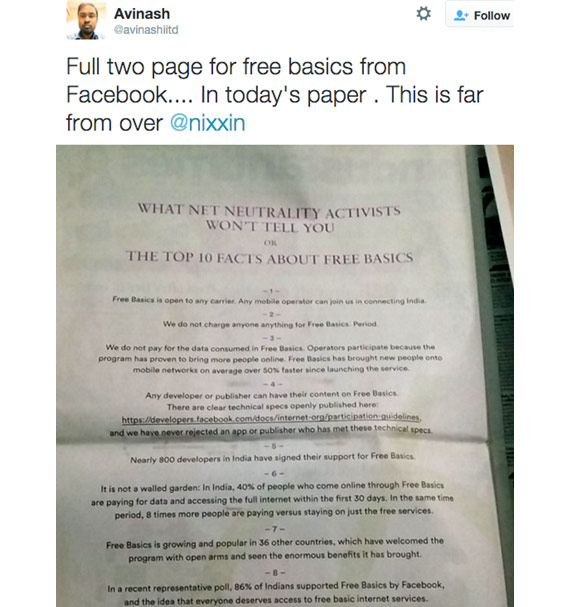Facebook vs. Activists, who’s winning the PR war?
PR Insight
Paarul Chand
It’s a classic David vs. Goliath story. The big, moneyed, global corporation against the scrappy, under dog activist. A PR campaign as old as time. So, who’s winning the battle here?
Usually, you have to wait a while to see the impact of a PR campaign. With the Net Neutrality vs. Free Basics campaign, the final decision maker of the success of this campaign is the Telecom Regulatory Authority of India (TRAI), which will take the final call on whether the ban on Free Basics should be lifted.
TRAI reaction to the ‘Free Basics’ campaign
TRAI has certainly not held back on its thoughts on the ‘Free Basics’ drive.
In a sharply worded letter to Facebook, TRAI has slammed the social media giant for not sharing specific questions asked by TRAI about ‘Free Basics’. Instead, users have been prompted through notifications to send a basic support mail to TRAI.According to newspaper reports, TRAI has stated that "Of the 2 million or so responses, a large number of these responses were simply 'I support Free Basics'.
Full page Ads by Facebook
The newspapers have also been regularly carrying full-page ads like this one by Facebook:

One-way communication by Facebook on Free Basics
Karthik Srinivasan, who heads Social @Ogilvy, believes that in terms of sheer noise and visibility, Facebook is winning by virtue of picking and choosing its' communication backed by large budgets.
“It is primarily using broadcast medium that is one-way communication - print, TV and outdoor to air its perspective. In comparison, the so-called activists seem like a ragged bunch trying their best using Internet, a 2-way communication medium and are being asked question at every turn. Most of them have got tired of answering the same questions, while Facebook has the liberty to pick and choose questions and answer them selectively, again using broadcast, one-way media. Facebook tried 2-way interaction too, on Reditt AMA and again was very selective in their answers.”
Srinivasan admits that, “The activists are also a bit more successful when it comes to interesting packaging of their arguments, unlike Facebook's corporate, drone-like messaging. While Facebook is using print ads, billboards and TVCs to share its perspective, the activists are using stories crafted by online video creators like AIB, TVF and Abish Mathew to convey their message. That creativity is the only minor success against Facebook's mega budgets.”
Facebook’s media engagement strategy
According to analysis on how Facebook is interacting with the media on 'Free Basics' , done for PRmoment India by Impact Research and Measurement, the media coverage reflect the complexity of the issue. According to Impact, while 42% of the coverage was firmly against ‘Free Basics’ and only 16% in favour, a whopping 42% was also mixed or neutral:
.jpg)
If this was an election, the 42% could swing the results of a campaign either way. The analysis is based on tracking 145 articles from the Delhi editions of major newspapers
Sentiment Analysis
The sentiment analysis shows that when it came to editorials, newspapers were completely against Free Basics, with Facebook performing better via interviews.
.jpg)
As the chart above shows, over half of the news generated was neutral. Srinivasan explains this trend, “When media reports their perspectives, efforts and arguments, they are always—as it should be—presented with the counter arguments from Facebook's side. But Facebook's advertising doesn't have any such impediments.”
Voices for and Against Free basics
The key influencers for and against Free Basics have few surprises. According to Srinivasan, “Facebook and telecom brands stand to gain enormously from differential pricing and hence are understandably very, very vocal in supporting ‘Free Basics’.”
Interestingly though, the Centre for Internet and Society’s Sunil Abraham is also a key pro ‘Free Basics’ influencer. The organisation is funded by Wikimedia Foundation for expanding Indic language free knowledge projects in India. Wikimedia Foundation which runs Wikipedia has been firmly against bundled services such as Free Basics.
In the against list, both the telecom minister and the chairman of TRAI have taken a public position against ‘Free Basics’:
For :
- Sunil Bharti Mittal, Founder, Chairman Bharti Enterprises
- Sheryl Sandberg, Chief Operating Officer, Facebook
- Kevin Martin, VP, Mobile and Global Policy, Facebook
- Chris Daniels, the Vice President of Product for Internet.org, Facebook
- Chris Cox, Chief Product Officer, Facebook
- Munish Seth, Country Manager-connectivity solutions, Facebook India
- Mark Elliot Zuckerberg, chairman, Chief Executive, and Co-founder, Facebook
- Sunil Abraham, Executive Director, Centre for Internet & Society
Against:
- Bhaskar Pramanik, Chairman, Microsoft India
- Kunal Bahl, Co-founder, Snapdeal
- R Chandrashekhar, President, NASSCOM
- R S Sharma, Chairman, TRAI
- Ravi Shankar Prasad, Telecom Minister
- Naveen Patnaik, Chief Minister of Odisha
- Sundar Pichai, CEO, Google
- Sanjiv Bikhchandani, Chairman, Nasscom
- Vijay Shekhar Sharma, founder & CEO, Paytm
- Marian Croak, Vice President of access strategy and emerging markets, Google
- Subho Ray, President, IAMAI
Final Impact
While the for and against rages on, its too early to call the game. While TRAI and the telecom minister have publicly spoken out against differential pricing, Mark Zuckerberg has used his personal stature to engage with Narendra Modi. This included a visit by Modi to Facebook and high profile visits by Zuckerberg to India.
Indians have always loved the underdog. Whether they pick Facebook, who has roped in the emotive cause of helping the poor or the activists who say they are saving the Internet against a commercially minded megacorp as the underdog, could well decide the future of Internet access in India.
If you enjoyed this article, you can subscribe for free to our weekly event and subscriber alerts.
Featured

PR professionals share their views on journalists publicly calling them out on story pitches

Auto blogger renders unconditional apology to Value 360 for defamatory posts

Hottest Indian startups of 2020, Paytm, Dreams 11 lead the charge: Wizikey Report




